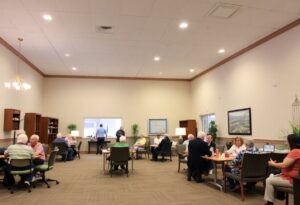With the right knowledge and support, you can significantly enhance the quality of life for your loved ones living with Parkinson’s disease in Anthem, Arizona. Understanding the challenges faced by seniors with this condition is imperative for providing effective care and creating a nurturing environment. This blog post explores practical strategies, local resources, and imperative tips that will empower you to make informed decisions while supporting your family member’s physical, emotional, and social well-being.

Understanding Parkinson’s Disease
Your approach to caring for a family member with Parkinson’s disease involves understanding this progressive neurological disorder. Characterized by the degeneration of dopamine-producing neurons in the brain, Parkinson’s affects movement and can significantly impact daily living. Awareness of the disease’s challenges is vital as you navigate support options and tailor your caregiving methods to best assist your loved one.
Symptoms and Progression
Against the backdrop of Parkinson’s disease, symptoms typically begin gradually and may include tremors, rigidity, and bradykinesia, which is an overall slowness of movement. As the disease progresses, you may notice changes in balance, gait, and even cognitive function, which can complicate daily activities. Staying informed about these symptoms allows you to adapt your caregiving to your loved one’s evolving needs.
Treatment Options
Among the numerous treatment options available for Parkinson’s disease, medications and therapy play pivotal roles in managing symptoms and improving quality of life. Medications such as levodopa can help replenish dopamine levels, while physical, occupational, and speech therapies are beneficial for maintaining mobility, daily function, and communication skills.
To effectively support your loved one, exploring a combination of treatment options can be beneficial. Medications often need adjustments over time, so collaborating closely with healthcare providers is crucial. Additionally, incorporating therapies tailored to their specific symptoms—like exercise programs designed for balance and strength—can greatly enhance overall well-being. Lifestyle modifications, including a healthy diet and social engagement, also help in managing the condition, fostering a comprehensive approach to care.
Emotional and Psychological Support
Even the most dedicated caregivers may face emotional challenges as they support a loved one with Parkinson’s. It is vital to understand that your feelings are valid and that seeking emotional and psychological support is important for both you and your senior. Providing a comforting environment and encouraging open conversations about feelings can make a significant difference in managing the emotional aspects of this illness.
Coping Mechanisms for Families
About finding effective coping mechanisms can significantly benefit your family in managing the emotional strain of caring for a senior with Parkinson’s. Establishing a support network, whether through friends, family, or support groups, can provide an important outlet for sharing feelings and experiences. Practicing mindfulness and engaging in hobbies can help you alleviate stress and foster a sense of normalcy during challenging times.
Resources for Mental Health
Across the community, numerous resources are available to support mental health for families dealing with Parkinson’s. You can access therapy sessions, support groups, and online forums to connect with others facing similar challenges. Engaging these resources can provide you with valuable coping strategies and emotional support.
But don’t overlook professional help, as mental health counselors and psychologists can offer tailored guidance to you and your loved one. Consider local professionals specializing in chronic illnesses, and reach out to organizations that support Parkinson’s patients and caregivers. These resources can strengthen your emotional well-being and improve your ability to care for your senior effectively.
Caregiver Roles and Responsibilities
One of your main roles as a caregiver for someone with Parkinson’s involves providing both physical and emotional support. This includes helping with daily activities, managing medications, and ensuring their safety within the home. You will also act as a liaison with healthcare professionals, helping to communicate any changes in symptoms or behavior. By understanding these responsibilities, you can enhance your loved one’s quality of life while also taking care of your own needs.
Daily Care Practices
Across various daily routines, consistency is vital for seniors with Parkinson’s. Establishing a regular schedule for meals, exercise, and medications can help them navigate the challenges that come with the disease. Simple tasks, such as assisting with grooming or meal preparation, can also be beneficial while ensuring their comfort and dignity.
Communication Techniques
Communication plays an vital role in your relationship with a senior who has Parkinson’s. Adapting your communication style can significantly improve understanding and connection. Speak slowly and clearly, using simple language, and always give them ample time to respond. Non-verbal cues, such as facial expressions and gestures, can also enhance communication. Additionally, maintaining eye contact reinforces engagement and demonstrates your attentiveness.
Plus, consider using written cues or visual aids to support verbal communication. These techniques can help your loved one express their needs more easily and reduce frustration when they struggle to find words. It’s about fostering an environment where they feel heard and understood, which greatly contributes to their emotional well-being.
Home Modifications for Safety
Unlike most conditions, Parkinson’s disease affects mobility and balance, making home modifications crucial for safety. You should consider installing grab bars in bathrooms, using non-slip mats, and ensuring that pathways in your home are clear of obstacles. Additionally, improved lighting and removing tripping hazards can significantly enhance safety for seniors living with Parkinson’s. A well-thought-out living space can lead to increased independence and comfort.
Fall Prevention Strategies
By implementing effective fall prevention strategies, you can significantly reduce the risk of injury for your loved one. Regular assessments of the home environment are necessary to identify potential risks. Encourage your family member to wear non-slip footwear and engage in physical activities that promote strength and balance. Regular communication about their needs and concerns will also contribute to a safer living environment.
Assistive Technologies
With the advancement of technology, assistive devices have become beneficial tools for seniors with Parkinson’s. These include mobility aids like walkers and scooters, as well as monitoring systems for daily activities. Integrating these technologies into your loved one’s daily routine can enhance their independence and safety.
Indeed, assistive technologies can transform how seniors manage daily tasks and maintain their autonomy. Devices such as automated medication reminders, smart home systems, and fall detection alarms can provide significant support. Installing voice-activated assistants and using mobility aids tailored to their needs will allow your loved one to navigate their environment more safely and confidently. Embracing these innovations can greatly enhance their quality of life while ensuring peace of mind for you and your family.
Community Resources in Anthem, Arizona
Once again, Anthem offers a variety of community resources that can significantly enhance the quality of life for seniors with Parkinson’s and their families. From support groups to healthcare services, you can find the tools you need to provide effective care and strengthen your support network. Exploring these resources is an imperative step in navigating the challenges of Parkinson’s disease in your community.
Local Support Groups
Support groups in Anthem provide a safe space for you and your loved ones to connect with others facing similar challenges. These gatherings offer valuable emotional support, practical advice, and a sense of community, making it easier for you to cope with the demands of caregiving.
Healthcare Services
By utilizing healthcare services in Anthem, you can access specialized medical support tailored for seniors with Parkinson’s. This includes local clinics, physical therapy centers, and occupational therapy that focus on enhancing mobility and overall well-being.
Resources like local clinics and specialists equip you with the necessary medical attention for managing Parkinson’s symptoms. You can also find home healthcare services that provide in-home support, allowing your loved one to maintain comfort and independence. Additionally, various wellness programs designed specifically for seniors promote physical activity and engagement, promoting overall health and vitality.
Nutrition and Exercise Recommendations
For seniors with Parkinson’s, maintaining a balanced diet and engaging in regular exercise can significantly improve overall well-being. Focus on incorporating a variety of whole foods, including fruits, vegetables, lean proteins, and whole grains, as these provide necessary nutrients that support brain health and help manage symptoms. Additionally, hydration is important for maintaining energy levels and preventing constipation, a common issue faced by individuals with Parkinson’s.
Diet Considerations for Seniors
Behind every meal, a nourishing diet can play a major role in managing Parkinson’s symptoms. Opting for anti-inflammatory foods, such as fatty fish, nuts, and leafy greens, can help reduce inflammation. It’s also beneficial to limit processed foods and sugars that may exacerbate symptoms. Speaking with a nutritionist can further tailor a diet plan to suit your loved one’s specific needs.
Importance of Physical Activity
The role of physical activity cannot be overstated for seniors dealing with Parkinson’s. Regular exercise not only aids in maintaining mobility and balance but also supports mental health by reducing feelings of depression and anxiety. Aim for a mix of aerobic, strength, and flexibility exercises to promote physical function and overall quality of life.
But engaging in physical activity is about more than just exercise; it’s a pathway to empowerment. Finding enjoyable activities, like walking, dancing, or yoga, can encourage consistency, providing both physical benefits and social interaction. Incorporating short sessions throughout the day allows your loved one to stay active and retain independence while also facilitating better coordination and reduced stiffness. Always consult with a healthcare professional to create a safe and effective exercise routine.
To wrap up
Presently, caring for seniors with Parkinson’s in Anthem, Arizona, requires you to be informed and prepared. Understanding the challenges they face and the resources available will empower you to provide the support they need. From creating a safe living environment to accessing community services and professional care, your role is pivotal in enhancing their quality of life. By staying informed and engaged, you can navigate this journey with compassion and resilience.


